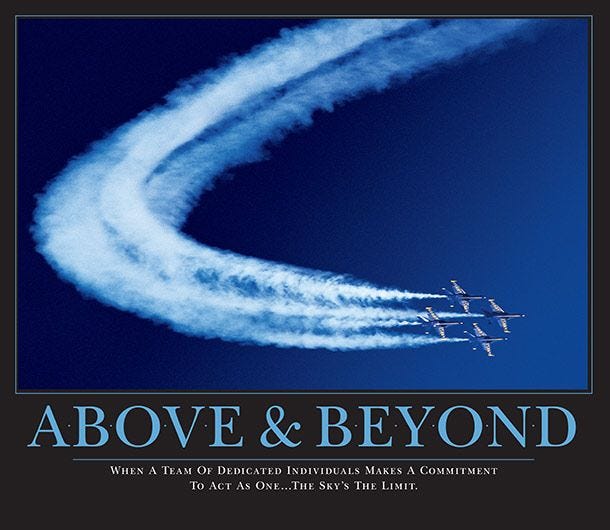
I started 2024 by randomly searching for “those weird motivational posters that populated offices in the 1990s” because I couldn’t remember the brand: SUCCESSORIES is it. Some of you may remember.
What led me to that search was thinking about how leadership is performed in organizations: The veneer of leadership vs. the reality of it, how leadership looks vs. how leadership is1.
As members of nearly any organization can tell us, we have problems in leadership, some of which can be traced back to how we do and do not prepare people to take on leadership roles, and in my mind, also to what we consider good leadership.
For new readers, welcome. Let me be clear about the two bodies of knowledge I bring to this conversation as well as my biases:
First, I have been a formal leader (pay-rolled professional with big girl health insurance) for more than 25 years. Second, I have a literal Ph.D. in leadership. I share that so that you know that I am (a.) a practitioner first and (b.) super nerdy about it.
And now, my biases: I choose to remain in the middle of organizations in light of my core belief that the strategic work of the organization is done there, and it’s in that spot where one truly witnesses the real molten action of the enterprise, and that’s very exciting to me.
I want as much understanding about the realities of the enterprise as possible, and I prefer to gain that understanding through the heat of direct observation and experience.
I’m also highly suspicious of people who set their sights on high-status or high-pay positions unless they’re able to articulate their motivations beyond achieving a certain job title. That bias comes from my own orientation toward work, which is simply that I want to do good work with good people.
I’ve also been thinking a lot about how leadership needs to look as we face our next wave of challenges, especially as I consider all of the great people who don’t want to lead. You can check out some of that research here, but basically, two-thirds of employees have no interest in taking on leadership roles, for reasons I completely respect and understand.
I think a lot, then, about how to position the right people in the right places, something I think can mitigate so many leadership problems (here’s a link back to the dangers of narcissistic leaders and another on the impact of poor leadership on good employees). And I’ve been thinking about how we develop the people who do have an interest in leadership for the right reasons.
For those who have taken leadership roles in any context, I do have questions as I contemplate these matters: How did the training look for you? What was the goal, context, content? Do you think it prepared you for the actual work of leadership? Did you walk away knowing exactly what you should be doing differently in order to lead effectively?
Some scholars say probably not and make suggestions for improving the situation. Their advice focuses on choosing the right development program by framing questions around vision, method, and impact:
These reframed questions are great. Part of the problem in making this assessment, though, is that very often people in organizations aren’t experts in leadership.
They might be in leadership positions — performing leadership — but that doesn’t mean that they know how to conceptualize whether or not a program will help participants “grow their ability to lead others.” Some of this question is a pedagogical one: How do they know the learning will occur?
Part of the difficulty, of course, is the contextually-bound nature of leadership. It’s incredibly difficult to know whether a development program will meet the needs of specific organizational contexts. It’s very difficult to design a generic leadership development program that can be picked up and dumped into a variety of organizational contexts.
But another part of the difficulty is that I’m convinced we carry flawed notions of good leadership that not only impede our enterprises but also prevent us from developing future good leaders. Here’s an illustration and my analysis of it based on something I witnessed just last week:
My spouse and I have been dealing with a lot of bureaucracy in the past year as the result of upheaval in our family because of an unexpected death, and we recently witnessed a moment that illuminated the slippery nature of good leadership.
We were sitting with a bank employee to close out an account of the deceased, and at one point, she called over her manager and said the following (my paraphrase):
I know you’re about to go to lunch, and I wanted to ask if you should notarize this document so that in the event the corporate office wants it, it’ll already be done and I won’t need to interrupt you.
(Me, internally: Love it! Great anticipation! Good job!)
Manager: Looks at screen and says, “Nah, I don’t think they’ll need it.”
Employee: (reiterates the case for doing it just in case)
Manager and employee engage in a bit of back and forth about whether or not to do it; meanwhile, I’m willing to bet that in the time it took them to have the conversation, the document could have been printed, stamped, and signed. But it wasn’t; they ended up not doing it.
That’s a very small moment, and some people would say, “Yeah, he made that decision based on his understanding of and expertise in the enterprise. He made the most efficient decision.” Efficiency is very often a value in a for-profit environment.
But here’s what I would have done in that moment as a supernerd:
I would view part of my job in that setting as helping employees see what we/I value, and I would take every opportunity to reinforce those things.
In that moment, I would validate her suggestion because I want to inspire problem-solving and confidence in employees. I want to demonstrate my value for their independent and proactive thinking.
Whether or not we need the form in the end is immaterial: I would have simply said “Excellent idea, and thanks for thinking ahead. Let me go ahead and prep this doc. I also appreciate your thinking about protecting my lunch hour. Thank you.”
Period. Because I value relationships and know how important they are in accomplishing literally anything in an organization, I simply would have commended her on her thinking and taken her suggestion. That small act would demonstrate my trust in her, inspire her trust in me, and operationalize what I say I value.
Further, I would express my appreciation for the fact that she took time to consider me and my needs in the situation. Isn’t that what we want from people?
And don’t I want them to gain confidence in their own perspectives knowing that it’s that kind of confidence that can help people feel more empowered in their work and potentially more likely to see themselves as potential leaders? Self-efficacy is something I’d want to develop in my team.
Now, imagine that small moment replicated time and time and time again. Ultimately, those small moments create the sum of our environments.
Is that typical? Is my explanation about how I would approach that situation emblematic of what happens on the ground in leadership? I’m asking because I honestly don’t know.
If the answer is no, you can see our problem, right? We say we value one thing, but we do something else. In that case, if we say we want independent thinkers, we should honor their independence in the moments in which they show it.
How do we capture the operationalizing of our values in leadership development? That’s not an easy thing to do, and I think the canned leadership development programs don’t quite capture what we need. I do think, though, that some core principles can translate into any organizational environment.
I’m going to work on fleshing out those things for you in 2024.
Up first: Let’s talk about the core leadership skill of listening. In the next post, we’ll use some research related to the nursing shortage and recommendations from researchers on the matter of listening that have applicability to any organization and to anyone leading other people.
We’ll talk about the dynamics that underpin our individual and organizational abilities to listen as well as strategies for improvement.
For example, the researchers make the point that
Most organizations limit their surveys to current employees. Exit interviews are administered haphazardly, if at all, and the feedback from former employees is too often dismissed as the rantings of malcontents. But ignoring feedback from former employees is a big mistake.
We’ll get into it, y’all, and the research will help us unpack some of what we discussed in the episode on Neurodiversity. I’ll also share with you the pitfalls of allowing anyone in your organization to dismiss concerns and feedback under the logic that “they’re just complaining.”
Until then, my friends, happy 2024!
I know people often want to make the distinction between leadership and management, but I’m convinced for a variety of reasons that I won’t unpack today that managing workflow and tasks or managing strategy requires the same core skills.
When I say “leadership,” then, I’m talking about anything that requires us to reach some end through the labor of ourselves and others.








Share this post